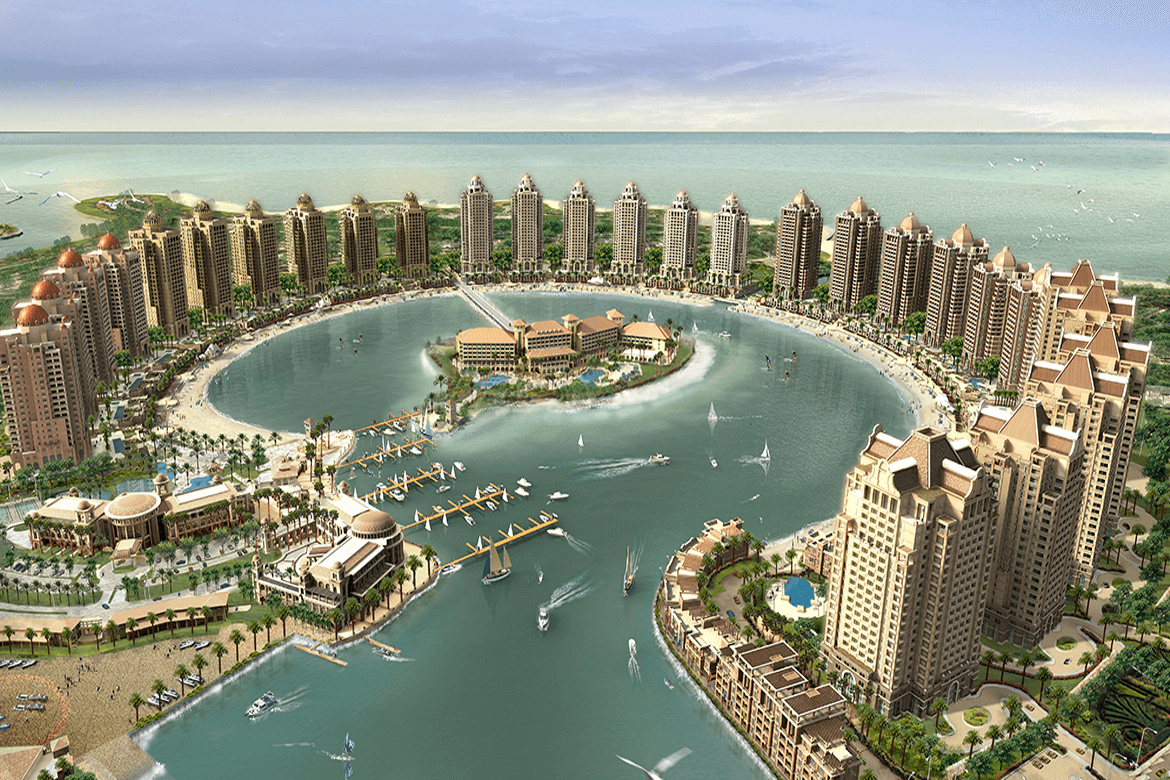Today, Qatar, like the UAE, attracts many expatriates due to its rapid economic development, career prospects, high standard of living, and favorable tax environment.
According to an analysis of twenty international financial centers, Qatar is now considered the best place for those seeking a combination of low taxes, high comfort levels, and security. In 2022, researchers from Merchant Machine concluded that with an average monthly income of $4,246, a 10% tax rate, and average living expenses of $637.16 per person (excluding rent), Qatar represents the “ideal place to live,” scoring the highest overall rating for its tax system.

Features of the Tax System in Qatar
Taxation in this Gulf country is characterized by its simplicity and the absence of many mandatory payments familiar to residents of other countries.
The main features are as follows:
- Low tax rates. The implementation of a flat corporate tax rate of 10% is attractive.
- Absence of personal income tax. Individuals do not pay income tax on their salaries.
- Value-added tax (VAT). Since 2019, the country has implemented a 5% VAT rate.
- Excise taxes. At the same time, excise taxes were introduced on a range of goods, such as tobacco products, non-alcoholic beverages, energy-saving lamps, and others.
- Property taxes and inheritance taxes are absent.
Despite the overall simplicity of the system, Qatar’s tax system is dynamic. It constantly evolves while maintaining high transparency and convenience for doing business. However, for making significant decisions, we recommend consulting with specialists.
Overview of the Legislative Framework Regulating Taxation in Qatar
The taxation system in Qatar is based on several vital laws:
- Corporate Income Tax Law (No. 24, 2004) sets the tax rate at 10%. This legislation defines the rules for taxing profits earned within and outside Qatar. Non-profit organizations, state-owned enterprises, and companies registered in the free economic zones (FEZs) are exempt from taxation.
- Value Added Tax (VAT) Law (No. 2, 2019) establishes a VAT rate of 5% and mandates registration for taxpayers with an inevitable turnover — 375,000 Qatari Riyals (QAR) over the last 12 months.
- Excise Tax Law (No. 1, 2019) introduces relatively high excise duty rates on excisable goods — ranging from 50 to 100% of the value. The list of excisable goods includes the following:
- Tobacco products.
- Non-alcoholic and energy drinks.
- Products containing sugar.
- Pork and pork products.
- Cosmetic products.
- Jewelry.
- Automobiles.
- Property Tax Law (No. 21, 2004). A property tax is not levied as a general payment in the country. Instead, land rent and rental income taxes are introduced, typically collected from property owners.
In addition, Cabinet resolutions regulating the implementation of VAT in Qatar and excise tax laws are significant.
Main Taxes in Qatar
| Tax | Rate |
|---|---|
| Tax on personal income | 0% Entrepreneurial income of individuals is subject to corporate income tax |
| Corporate profit tax (corporate) | 10% For oil companies — 35% |
| Capital gains tax | 10% |
| VAT | 5% |
| Global minimum tax (GMT) | 15% |
| Social and sports contribution | 2.5% of annual net profit (paid by companies listed on the Qatar Stock Exchange) |
| Stamp duty | 0% |
| Excise duty | 50–100% |
| Customs duty | 5% |
| Dividends | 0% |
| Interest tax | 5% |
Please note that the information provided here is not legal advice and is for informational purposes only.
For professional advice, we recommend contacting the managers of our company, Dynasty Business Adviser. They will provide you with more detailed and up-to-date information, as well as assist you with tax matters relevant to your situation.
Taxation of Individuals in Qatar

Individuals must adhere to the rules and procedures established by law, including timely submission of declarations and payment of tax obligations.
In Qatar taxes are regulated through a territorial taxation system. In other words, individuals are taxed in Qatar on income derived from sources within the country, regardless of residency. Income tax applies to earnings from self-employment and investments.
Who Falls under the Income Tax?
In Qatar, income tax is not levied on the salaries and allowances of employed individuals. However, self-employed individuals are subject to income tax if their profits originate from sources within the country.
Who Is Considered a Tax Resident?
An individual is considered a resident of Qatar if they have a permanent residence in the country, spend more than 183 days in Qatar per year, or have their center of vital interests here.
Social Contributions
There are no social security contributions for individuals in Qatar, but employers must pay social insurance for Qatari workers.
Income from Entrepreneurial Activities
It is subject to income tax if derived from sources in Qatar.
Taxation of Capital Gains
Capital gains from the sale of assets are usually exempt from taxation if these assets are not part of taxable activities.
Dividends, Interest, and Rent Payments
If received by an individual, they are generally not subject to income tax. Qatar also does not impose mandatory estate or gift taxes.
It should be noted that despite the absence of personal income tax, Qatar is not a tax haven. Authorities actively combat tax evasion and impose strict sanctions on violators. If you have additional questions about which taxes in Qatar are mandatory or require professional consultation, we recommend seeking advice from qualified experts at Dynasty Business Adviser.
Taxation of Legal Entities in Qatar
Qatar operates a corporate taxation system that applies to all legal entities. The central rates are as follows:
- 10% – corporate income tax for most companies.
- 35% – corporate income tax for oil and gas extraction companies.
- 10% – tax on interest.
- 5% – tax on royalties.
- 0% – property tax and dividends.
It is important to note that companies wholly owned by Qatari citizens and citizens of the Gulf Cooperation Council (GCC) countries are exempt from corporate income tax.
Overall, it can be argued that Qatar’s corporate taxation creates favorable conditions for doing business and attracts investments. There are various types of tax incentives for companies investing in specific sectors of the economy. Foreign companies registered in the country can access the same tax incentives as local organizations.

Tax Incentives for Business in Qatar
To attract investments, stimulate the development of specific economic sectors, and support small and medium-sized enterprises, Qatar offers a range of incentives. The main categories include:
- Profit tax exemption:
- For companies wholly owned by Qatari citizens or GCC countries.
- For companies registered in free economic zones.
- For companies engaged in exports.
- For startups and small enterprises.
- Reduced profit tax rates:
- For companies investing in priority economic sectors.
- For companies engaged in research and development (R&D).
- Tax credits:
- For R&D expenses.
- For employee training expenses.
- For infrastructure investments.
It is worth noting that companies registered in free economic zones can benefit from a range of advantages, such as exemption from corporate income tax and VAT, as well as simplified registration and business procedures.
Here’s a brief overview of Qatar’s Special Economic Zones (SEZs):
- Hamad Port Free Zone (HPFZ). A major free economic zone in the Hamad Port. It offers logistics, trade, and manufacturing companies various incentives and benefits.
- Qatar Science and Technology Park (QSTP). An innovative technology park specializing in scientific research, advanced technology development, and innovation commercialization.
- Qatar Financial Centre (QFC). A specialized economic zone focused on financial services, including banking, insurance, investments, and asset management.
- Manateq Economic Zone. Manateq manages several economic zones in Qatar, such as Logistics Village Qatar (LVQ), Small and Medium Enterprise (SME) Zone, and Industrial Zones, providing infrastructure and services for various types of businesses.
- Ras Bufontas Free Zone (RBFZ). A new free economic zone located near the Hamad International Airport, intended for the development of the logistics and transportation sectors.
The terms for obtaining tax incentives may vary, so we recommend staying updated on legislative changes and seeking advice from specialists at Dynasty Business Adviser if needed.
Where to Start Creating Your Business in Qatar?
If you want to open your company in Qatar, our team of experts will assist you at every stage:
- Location selection.
- Registration.
- Legal support.
- Financial services.
- Business development.
Description of steps
- Step 1. We will select a free economic zone ideally suited to your business model.
- Step 2. We will prepare all necessary documents, licenses, and visas.
- Step 3. We will provide professional legal consultation according to Qatari legislation.
- Step 4. We will help you open a bank account, optimize taxation, and establish a reliable accounting system.
- Step 5. We will assist with scaling and establishing holdings and trust funds.
For professional assistance in creating and managing a business in Qatar, please contact the managers of Dynasty Business Adviser company.
Benefits of Collaborating with Dynasty Business Adviser
Dynasty Business Adviser offers a wide range of business consulting services, including the following:
- Registration of firms of various ownership forms.
- International tax planning.
- Consultation on taxes in Qatar for both legal entities and individuals.
- Opening of bank accounts.
- Sale of existing foreign enterprises.
- Obtaining complex licenses.
- Document legalization.
By collaborating with Dynasty Business Adviser, you gain:
- Professional assistance and support at all stages of creating and managing a business in Qatar.
- Individual approach to your needs.
- High level of confidentiality.
- Access to a wide range of resources and partners.
- Time and cost savings.
- Confidence that your business complies with all legal requirements.
Dynasty Business Adviser — your reliable partner on the path to success in business in Qatar!









